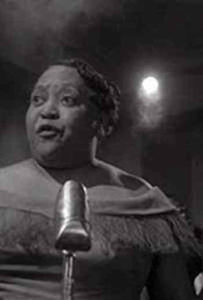
Mae Barnes(album cover)
This date celebrates the birth of Mae Barnes in 1907. She was a Black dancer and singer whose basic swinging approach fell between jazz and middle-of-the-road pop music.
From New York City, Edith May Stith (her name at birth) grew up in Manhattan. At age 12, she dropped out of school, moved to Cleveland, and got a job as a chorus girl at the Plantation Club in Harlem. She toured the South as a vaudeville performer and, in 1924, made her Broadway start in the revue "Runnin' Wild." The show introduced the Charleston to Broadway. As a stage performer, Barnes was nicknamed "the bronze Ann Pennington," after the Broadway star.
Her dancing in the national tour of "Shuffle Along" led Bill Robinson to call her "the greatest living female tap dancer." A car accident in 1938 fractured her pelvis, and she turned to singing. As her cabaret career developed, she moved to more upscale New York clubs like Cerutti, the Little Casino, and the Blue Angel. In the early 1950s, she became the main draw of the Bon Soir, the cellar club in Greenwich Village.
A favorite of high society, she frequently performed at Elsa Maxwell's parties and counted the Duke and Duchess of Windsor among her friends. In 1950, Barnes also appeared in the "Ziegfeld Follies" that closed in Boston. Her final Broadway appearance was in 1954 in "By the Beautiful Sea," starring Shirley Booth. She continued to do shows in clubs worldwide into the 1960s and recorded for Atlantic and Vanguard Records.
Barnes was famous for her unique material, songs like "(I Ain't Gonna Be No) Topsy," a statement of Black pride, and for her mocking interpolations into familiar lyrics; she loved to poke fun at the songs of the day. Mae Barnes died of cancer in Boston on Dec 13, 1996.
Reference:
To Become a Dancer